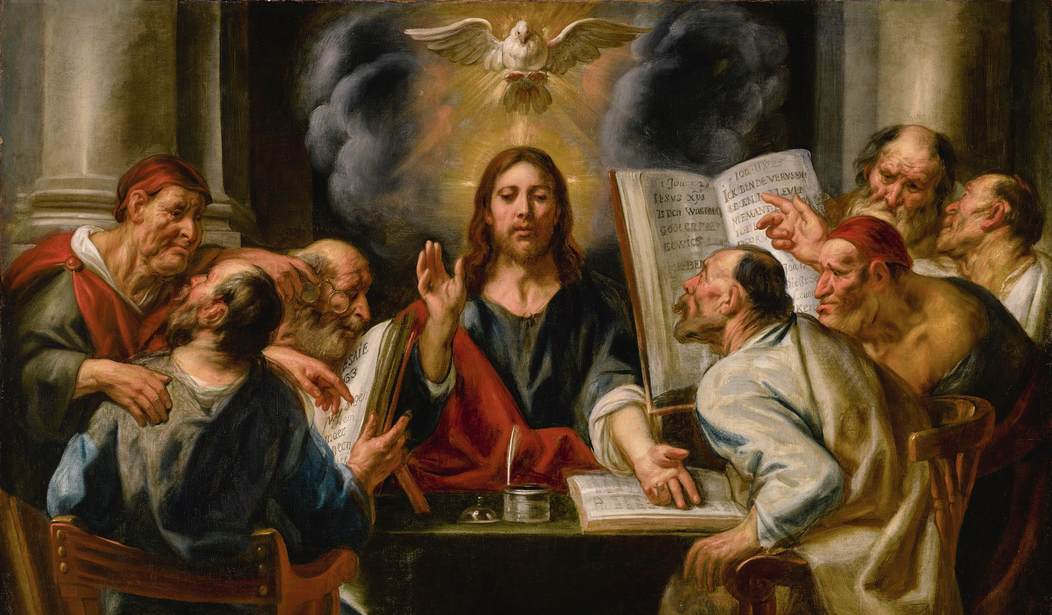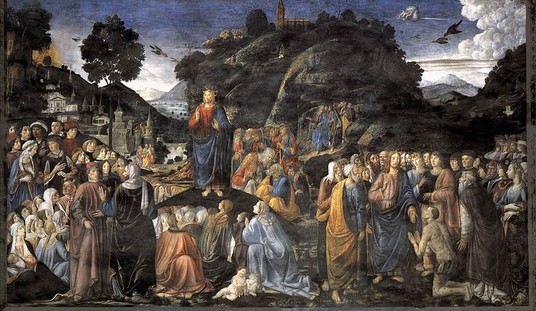This morning’s Gospel reading is Matthew 21:28–32:
Jesus said to the chief priests and elders of the people: “What is your opinion? A man had two sons. He came to the first and said, ‘Son, go out and work in the vineyard today.’ He said in reply, ‘I will not,’ but afterwards changed his mind and went. The man came to the other son and gave the same order. He said in reply, ‘Yes, sir,’ but did not go. Which of the two did his father’s will?” They answered, “The first.”
Jesus said to them, “Amen, I say to you, tax collectors and prostitutes are entering the kingdom of God before you. When John came to you in the way of righteousness, you did not believe him; but tax collectors and prostitutes did. Yet even when you saw that, you did not later change your minds and believe him.”
Anyone who has ever parented, taught, or spent much time around adolescents will know and dread this phrase: That’s not fair! The more honest among us will recall that being our own favorite retort when dealing with parental edicts, school rules, or life in general.
We’ll also recall the usual parental/educator/grumpy elder response to that complaint: Whoever said life was fair? As answers go, it didn’t amount to much intellectually or philosophically and seemed to us adolescents as a tacit admission of the shortcomings of authoritarianism.
That was the only answer that would suffice in the short term, however, because adolescents — and older people who should know better — are not intellectually or philosophically prepared for the real answer. The real answer is that none of us are gifted with the perfect knowledge and understanding to pass judgment on fairness, and adolescents least of all. Parents almost always had a better grasp on a larger reality, and even they don’t have enough of that to express “fairness” beyond the immediate circumstance.
We adolescents of all ages can take heart in today’s first reading from Ezekiel, which makes it apparent that our Lord found this just as tiresome among the adult Israelites. The Lord doesn’t opt for the common response, but instead uses this to warn the Israelites that they are blinded to both fairness and mercy, thanks to their reliance on their own judgment rather than the Lord’s. If He were to use their ways of “fairness,” life would not work out well for them, He warns:
Thus says the LORD:
You say, “The LORD’s way is not fair!” Hear now, house of Israel: Is it my way that is unfair, or rather, are not your ways unfair? When someone virtuous turns away from virtue to commit iniquity, and dies, it is because of the iniquity he committed that he must die. But if he turns from the wickedness he has committed, and does what is right and just, he shall preserve his life; since he has turned away from all the sins that he has committed, he shall surely live, he shall not die.
That is far more comprehensive and useful than whoever said life was fair. It also gets to the heart of the “fairness” issue: the perception of justice. Adolescents are all about justice, at least from their limited perspective, which is to say they’re all about justice for themselves. But as we see from this rebuke in Ezkiel, that’s not limited to adolescents.
The nominal issue at hand in this passage was the insistence by the Israelites that the sins of the father should be applied to the son (and vice versa), most likely because of a thirst for vengeance against those who sinned, especially violations of the Ten Commandments. That is not true fairness, the Lord declares, and goes on to declare that even those who sin will be forgiven by Him if they truly repent, which is clearly what the Israelites resent most and has caused the Lord to intervene through Ezekiel:
Do I take any pleasure in the death of the wicked? declares the Sovereign Lord. Rather, am I not pleased when they turn from their ways and live?
The Lord then tells the Israelites that if they continue to arrogate His authority to judge souls, He will make them abide by their ways rather than through His mercy:
Therefore, you Israelites, I will judge each of you according to your own ways, declares the Sovereign Lord. Repent! Turn away from all your offenses; then sin will not be your downfall.
Well … wouldn’t that be fair? Wouldn’t that be justice, at least according to our own adolescent sights? The Lord previews Jesus’ later exhortation, “Judge not lest ye be judged,” which truly means to refrain from arrogating God’s authority to judge souls, exactly in the manner described in Ezekiel. That is not our job, because “our ways” are limited to our own perspective rather than the omniscience of the Lord, much more than the difference between a pre-teen and his parents.
In today’s Gospel, Jesus deals with the same adolescent viewpoint of justice and mercy, this time among the temple authorities. Rather than point to Ezekiel, Jesus uses a hypothetical to demonstrate the same principle. He makes it easy enough to allow the priests and elders to grasp the truth, and then tries to open their eyes to their failure to live it properly.
This is a far gentler and merciful rebuke than the Lord gave through Ezekiel. Jesus came to call the sinners, but He also tried to open the eyes of the powerful. Everyone falls short of the glory of God, and everyone has need of His grace to return. That is the lesson Jesus teaches to the priests and elders, as well as the abundance of God’s mercy, which is infinitely larger than anything we can imagine. Jesus gives the Lord’s final exhortation in Ezekiel to all: “Repent and live!”
In this context, fairness becomes almost a laughable concern. This world will pass away from each of us at some point, which makes fairness in a human context a silly and insubstantial basis. What we need is a firm grasp on the eternal, and a true faith that the Lord sees what is fair and just from that perspective and wants to shower us in mercy so long as we come to Him in trust and love.
As Paul writes in 1 Corinthians 13 (not in today’s reading): ‘When I was a child, I spake as a child, I understood as a child, I thought as a child: but when I became a man, I put away childish things.” We must grow up and recognize our right relationship with the Lord and submit to His authority, because no one ever honestly claimed the fallen world will be fair … but He will be more than fair in the eternal life.
The front-page image is “Christ Among the Pharisees” by Jacob Jordaens, c. 1660-70. Via Wikimedia Commons.
“Sunday Reflection” is a regular feature, looking at the specific readings used in today’s Mass in Catholic parishes around the world. The reflection represents only my own point of view, intended to help prepare myself for the Lord’s day and perhaps spark a meaningful discussion. Previous Sunday Reflections from the main page can be found here.








Join the conversation as a VIP Member